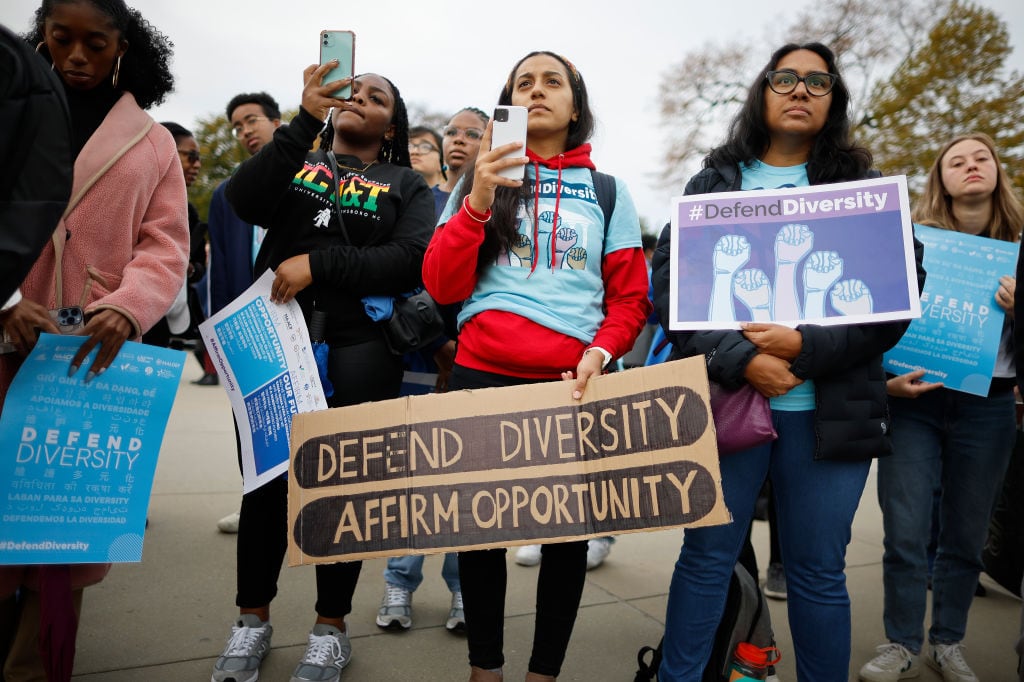Sign up for Chalkbeat’s free weekly newsletter to keep up with how education is changing across the U.S.
The U.S. Department of Education is giving state education agencies 10 days to certify that their schools do not engage in any practices that the administration believes illegally promote diversity, equity, and inclusion.
Those that do not sign a certification that they are in compliance with the administration’s controversial interpretations of civil rights law will not receive any federal funding, officials said. Federal funding represents about 10% of all K-12 funding nationwide but makes up a larger share of local budgets in high-poverty districts.
The Trump administration has pledged to dismantle the U.S. Department of Education and return education oversight to the states. At the same time, the Education Department has made aggressive and unusual use of its civil rights authority to extract concessions from elite universities and pressure states to change their policies.
Some experts questioned the basis for the demand and said the administration could not legally withhold money from states that don’t sign. The threat comes as many school districts are preparing their budgets for the next school year amid significant economic uncertainty.
“Federal financial assistance is a privilege, not a right,” Craig Trainor, acting assistant secretary for civil rights, said in a statement. “When state education commissioners accept federal funds, they agree to abide by federal antidiscrimination requirements.
“Unfortunately, we have seen too many schools flout or outright violate these obligations, including by using DEI programs to discriminate against one group of Americans to favor another based on identity characteristics in clear violation of Title VI.”
Title VI is a provision of federal civil rights law that bars discrimination on the basis of race or shared ancestry. States regularly certify that they are in compliance with Title VI in order to receive federal funds.
Thursday’s demand goes further by requiring states to say they also are in compliance with the U.S. Supreme Court decision in Students for Fair Admissions v. Harvard. The case banned the use of race in college admissions decisions. The Trump administration interprets the ruling to mean many common diversity practices are illegal.
Seth Galanter, an attorney who served as principal deputy assistant secretary in the Education Department’s Office for Civil Rights in the Biden administration, called the new certification “a baffling document that appears only to be trying to bully states and school districts.”
In signing, state education officials would be promising that all of their school districts are in compliance and acknowledging that they could be liable for fraud under the False Claims Act if they request federal funds and are later found to be in violation of the law.
The False Claims Act, a federal law, also allows private parties to sue for damages, Galanter said, and win higher penalties than in civil rights cases. By invoking the False Claims Act, Galanter said the administration appears to be threatening states and school districts with more serious financial risks if they want to defend their diversity policies.
But states shouldn’t need to sign the new certification, Galanter said, when they have already certified compliance with civil rights law. The new certification also doesn’t appear to have followed federal laws related to creating new paperwork, he said, meaning states can’t be penalized for refusing to sign.
Nor is it reasonable to give state education agencies 10 days to make legally binding promises about the practices of the nation’s thousands of school districts, he said.
“That is not serious governance,” Galanter said. “It’s stagecraft.”
Demand based on new interpretation of Supreme Court case
Education Department officials said in a February Dear Colleague letter that the Students for Fair Admissions decision meant any consideration of race or of proxies for race in educational settings would violate civil rights law.
The Trump administration has said the ruling extends to considering race as a factor in school admissions, hiring or promoting staff, awarding students scholarships or prizes, providing students with administrative support, and deciding how students should be sanctioned or disciplined.
For example, dropping the use of test scores as an admissions criterion for a selective program with the hopes of increasing racial diversity, or holding a separate graduation ceremony to recognize students of a particular ethnic group, could violate the law.
The first investigation opened by the administration under this new interpretation began last month. It targeted colleges and universities that partnered with an organization that provided mentorship for graduate students of color.
Many legal experts believe the administration’s interpretation goes much further than the Supreme Court did and is not supported by the law.
The Dear Colleague letter generated significant confusion among school and district leaders and is being challenged in court. Conservative groups have adopted its argument to challenge initiatives that aim to address long-standing disparities, such as Chicago’s recently unveiled Black student success plan.
Eric Duncan, director of P-12 policy at EdTrust, an advocacy group, said the certification demand appears to be an effort to put states on notice that they could be investigated, similar to the way the administration has targeted Maine over transgender athletes.
States do have an obligation to ensure their programs don’t discriminate based on race, he said, but they also have an obligation to work to fix racial inequities. Federal law hasn’t changed, he said, and states could choose to defend their diversity programs based on their own understanding of the law.
“It’s really in states’ hands right now,” he said.
‘Diversity is a superpower’ says NYC chancellor
Several state education agencies told Chalkbeat they are reviewing the letter and consulting with their attorneys.
“Diversity is a superpower here in New York City, we are always going to honor that,” New York City Chancellor Melissa Aviles-Ramos said in response to questions at an unrelated event Thursday. “We are always going to make sure that we are serving every child and family in New York City.”
At a policy committee meeting, Philadelphia Board of Education member Joan Stern, reflecting on the likelihood that any funding threats will be challenged in court, said, “Anything that appears to be final is usually not final.”
Every presidential administration attempts to use its influence to shape local policy, Galanter said. The Trump administration is using that influence differently, though. Trump’s Office for Civil Rights has publicly opened investigations based on media reports rather than formal complaints, and has reached conclusions relatively quickly.
Historically, even when the federal Education Department found school districts to be in violation of civil rights law, the federal government has worked with them on resolution agreements rather than actually withhold funding.
But any school district or state education agency considering its options now will have to look at the example of Columbia University, where the Trump administration abruptly canceled $400 million in grants and contracts after finding that pro-Palestinian protests had created a hostile environment for Jewish students.
The Education Department presented the university with a list of demands that included ceding control of one academic department, and the university complied.
“There’s lots of ways to influence behavior that are perfectly legitimate, and they may put schools on the spot, but the schools still have real choices,” Galanter said. “What this administration is doing is trying to rule by edict. They say, ‘do it our way, or something bad may happen.’ And they tried to make it so that the threat seems credible.”
This story has been updated throughout with reaction and additional background information.
Carly Sitrin, Amy Zimmer, and Alex Zimmerman contributed reporting.
Erica Meltzer is Chalkbeat’s national editor based in Colorado. Contact Erica at emeltzer@chalkbeat.org.







